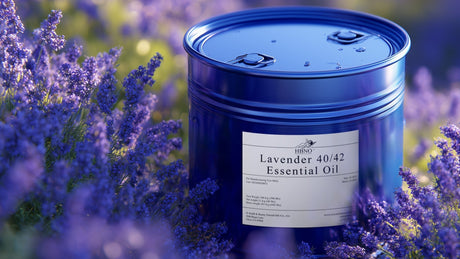When picking essential oils, understanding the difference between "organic" and "non-organic" is super important. With more people interested in wellness and caring for the environment, lots of buyers like products that reflect their values.
That's why understanding the advantages of organic oils can help consumers make more informed choices. These oils are often preferred for their natural sourcing, eco-conscious production, and alignment with clean living principles.

What Are Organic Essential Oils?
Organic essential oils are made from plants that are grown without synthetic pesticides, herbicides, or genetically modified organisms (GMOs). These oils typically carry certification from recognized bodies such as the USDA or EU Organic, which ensures that every step of the process-from seed to bottle-meets strict organic standards.
This certification gives buyers confidence that the oil is produced in a way that minimizes chemical contamination and adheres to environmentally sustainable practices. While organic certification doesn't necessarily mean the oil is more effective, it does signify a commitment to transparency, traceability, and environmentally mindful cultivation.
Non-Organic Essential Oils: Are They Inferior?
Non-organic essential oils are produced using conventional farming methods, which may involve the use of pesticides and chemical fertilizers. However, this does not automatically mean they are unsafe or low-quality. Many reputable essential oil suppliers test their products for purity and contamination, ensuring they meet high-quality standards regardless of whether the product is certified organic.
In fact, the effectiveness of essential oils depends more on the chemotype, growing conditions, harvest timing, and extraction process than on the organic label alone. So while organic status is one factor to consider, it's not the only indicator of quality.

The Role of Extraction Methods
How essential oils are extracted also impacts their overall purity and potential contamination. Steam distillation is the most common method used for essential oils and, in many cases, helps eliminate residual chemicals due to high heat and pressure. This method is particularly effective for flowers, leaves, and wood-based oils.
Cold-pressed oils-like those from citrus peels-may retain more surface-level pesticide residues if grown conventionally. That's where organic oils may offer an advantage, especially for oils like lemon essential oil organic, orange essential oil organic or bergamot essential oil, where cold pressing is used, and surface contaminants might remain.
Choosing organic citrus oils, for example, can help minimize exposure to these residues.
Environmental Benefits of Organic Essential Oils
One of the most compelling reasons for choosing organic essential oils is their environmental impact. Organic farming practices are designed to protect and regenerate the soil, reduce pollution, and support biodiversity. These methods avoid synthetic chemicals that can leach into waterways and harm nearby ecosystems.
By supporting organic agriculture, you're not just investing in a product-you're backing a larger mission of environmental sustainability. Farmers and producers who commit to organic practices often promote healthier habitats, pollinator populations, and long-term agricultural viability.
Additionally, organic farming is generally more labor-intensive and requires greater attention to soil health, crop rotation, and pest control through natural means. While these practices are more demanding, they contribute to a cleaner planet and more responsible resource use.

Ethical and Transparency Considerations
Another significant advantage of organic essential oils is traceability. Certified organic products are required to follow specific documentation and tracking protocols, which often results in greater transparency for the consumer.
Many organic producers also adhere to higher ethical standards, including fair trade practices and responsible sourcing. If supporting social responsibility and transparency is important to you, choosing an organic-certified oil from a reputable brand can give you peace of mind.
However, it's worth noting that some small-scale farmers may use organic farming techniques without undergoing the certification process due to its cost and complexity. In such cases, look for brands that offer third-party lab reports or details about their growing and harvesting methods to ensure quality and integrity.
Cost and Accessibility
One of the main differences between organic and non-organic essential oils is cost. Organic essential oils tend to be more expensive, primarily because of the costs involved in organic certification, labor-intensive farming, and smaller yields per acre.
While price can be a limiting factor for some consumers, the added cost often reflects the higher standards of production, environmental care, and documentation. Still, non-organic oils from reputable suppliers can be equally effective and safe, especially when third-party testing and quality assurance are in place.
For those who prioritize budget over certification, non-organic oils can be a practical choice-just be sure to verify the brand's testing practices and sourcing transparency.
How to Make the Right Choice
Ultimately, the decision between organic and non-organic essential oils depends on your personal priorities. If your focus is on supporting sustainable agriculture, reducing chemical exposure, and making ethical purchasing decisions, understanding the advantages of organic essential oils will likely steer you in that direction.
However, if you're looking for affordability without compromising much on purity, non-organic oils from trusted brands can still meet your needs-especially if the company provides detailed sourcing and testing information.
When evaluating a brand or product, consider the following:
- Is the oil certified organic? If not, does the brand still follow organic practices?
- Do they offer third-party GC/MS (Gas Chromatography/Mass Spectrometry) reports to prove purity?
- Are their sourcing practices ethical and environmentally conscious?
- Is the oil packaged and stored correctly to preserve quality?
Taking the time to research and ask questions can help ensure that your essential oil choices align with your wellness goals, environmental values, and personal ethics.
Final Thoughts
Understanding the advantages of organic essential oils means choosing products that align with your values-supporting cleaner ingredients, sustainable practices, and responsible sourcing. For premium-quality organic and non-organic essential oils you can trust, explore HBNO bulk extensive wholesale selection today.




